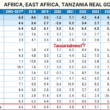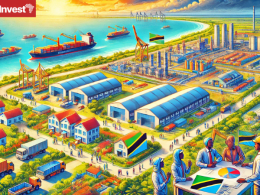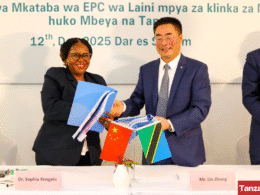TANZANIAINVEST interviewed Mr. T.C. Machemba, Ag. Executive Director of the Tanzanian Chamber of Commerce, Industry and Agriculture – TCCIA, in order to gain insight about the investment opportunities that are available for foreign investors in the Tanzania commerce, industry, and agriculture sectors.
| T.C. Machemba, Ag. Executive Director, Tanzanian Chamber of Commerce, Industry and Agriculture |
TI: What has been the development of Tanzania’s Agriculture sector, where are you now and where are you heading?
T.C. Machemba, Tanzanian Chamber Of Commerce, Industry and Agriculture: I think that we’re heading towards a good direction.
In the 1970s, agriculture used to be the main stream of the economy of the country and we performed very well.
But then in 1980s because of liberalization and other changes, there was no subsidy so most of the farmers had to adopt marketing.
Their products were not able to find markets and so production went down because of the changes in the economy.
Most of the products were exported.
In those years, we didn’t have non-traditional crops.
We normally used to export what we call cash crops – sisal, tea, coffee.
And most of them used to be bought by cooperatives, which were independent bodies.
Some of the cooperatives were operating commercially and some of them weren’t.
But they were subsidized in a way.
So when liberalization came, some of the cooperatives were heavily indebted and they collapsed.
Now, the sector is picking up in the sense that a lot of these products are finding new markets and also production, especially agro-processing is picking up and so it’s also creating markets for the agricultural products.
Agro-processing, which has the capacity to build value added here rather than selling the raw products is, I think, the future of the industry as well.
We’re heading that way, but so far we’ve just started.
TI: So the idea in developing the sector is to first of all ensure that an adequate level of productivity in agriculture is there and then to make sure that you develop the agro-business?
TCM: Yes.
TI: Let’s look at the first step – the level of productivity. Are you satisfied with the productivity of the current crops or is there a room for improvement?
TCM: There is definitely room for improvement.
But compared to some years back, I think, we’re going in the right direction.
At one time, we had the mentality that only cash crops could be sold.
Now most people are realizing that they can make money by selling even food crops.
These people have now adopted a new mentality.
And some people are shifting from selling the cash crops to selling the non-traditional crops.
TI: What do you mean by traditional and non-traditional crops?
TCM: For instance, sisal, coffee, and tea – these are the crops we call traditional.
In the days before liberalization, we had two categories – cash crops and food crops.
If people wanted to make money then they had to grow cash crops, including cotton.
Then they realized they can sell the food crops, rice for instance, and can earn money.
They can sell spices; they can sell vanilla and can make money.
{xtypo_quote_right}The non-traditional products […] are now being introduced to the economy and they’re doing well.{/xtypo_quote_right}The non-traditional products, which I can refer to as new products – the products that we didn’t sell before, are now being introduced to the economy and they’re doing well.
People are exporting, even fruits; in those days, we couldn’t have thought of exporting fruits but now people are thinking of exporting them.
For instance, some people are exporting mangos now.
So, the non-traditional products are the new additions to the economy – which are making a difference as well.
Tanzania Investment Opportunities in Agriculture
TI: In this new development and productivity, what role is assigned to foreign investors and what opportunities are there for FDI?
TCM: I think I can say that if there is anything we lack in the agriculture sector then it is foreign investment. {xtypo_quote_right}if there is anything we lack in the agriculture sector then it is foreign investment.{/xtypo_quote_right}
If we are to attract any investment, it should be in agriculture.
So far, we haven’t managed to attract many people but it’s very important that we do so.
TI: Is it a question of capital or technology?
TCM: A combination of both.
Capital is very important in agriculture but so is know-how; especially since it’s related to the knowledge of which products can be sold where.
Because if we don’t have that knowledge of which product we’re going to grow is required in London, or in Amsterdam, or in Beijing, then there is no point in growing anything.
TI: How much does agriculture contribute to the GDP of the country and, based on your experience, by what percentage can the productivity of agriculture improve in Tanzania?
TCM: So far, agriculture contributes about 46% of GDP.
I think, assuming everything to be going the right direction, it can grow up to 50% but it depends on the other sectors.
And the productivity also depends on different products.
TI: What are the products which currently have good productivity?
TCM: Coffee and tea.
TI: And what are the products that have low productivity now but that with adequate technological input can achieve tremendous productivity?
TCM: Grain, mostly cereals maize, wheat.
TI: From the perspective of foreign investors in Tanzania, why do you think agriculture is an appealing sector in this country? What makes it so attractive to grow something here rather than to grow anything somewhere else?
TCM: There are a lot of opportunities, if people are willing to come to invest here.
{xtypo_quote_right}In Tanzania, we still have plots of land which are just lying idle and the weather is very favorable.{/xtypo_quote_right}In Tanzania, we still have plots of land which are just lying idle and the weather is very favorable.
I think the problem is that, we haven’t promoted agriculture enough as compared to other industries such as mining or tourism.
This is because, when compared with those sectors, agriculture doesn’t provide quick profit.
Productivity of agriculture also depends on different factors; for instance, the weather and also the financial sector.
So the other sectors are promoted more than agriculture is.
But there are lots of opportunities for people who want to invest in Tanzania.
TI: Is the financial sector in Tanzania supportive of agriculture?
TCM: At one time, it wasn’t supportive of agriculture.
That is going to change because of competition in the financial sector and also because many banks in the country are realizing that they should support the agriculture sector.
We’re talking about poverty eradication in the country.
And if the banks want to participate in the poverty eradication program, then their contribution in financing the agriculture projects is very important.
TI: Is the government providing any specific incentives for the sector?
TCM: Yes, there are many incentives.
The Tanzanian Investment Center (TIC) has been publicizing the incentives.
For instance, the Tanzanian Investment Center (TIC) has allocated vast areas of land for investors in agriculture.
{xtypo_quote_right}Anyone interested in investing in agriculture won’t have any trouble accessing land.{/xtypo_quote_right}In Tanzania, we still have plots of land which are just lying idle, and the weather is very favorable.
A person need only register to Tanzanian Investment Center and Tanzanian Investment Center will do all of the things needed to acquire land for investing.
By doing so, the government is trying to reduce the procedures which a person who wants to invest in agriculture has to go through.
And also, imports of most of agricultural inputs are duty free.
So, those are some of the incentives that can make someone decide to invest in the agriculture sector.
TI: The food processing industry is one area of agro-business that is of crucial importance for generating value in the country. How supportive is the infrastructure of the country?
TCM: I think agro-business is not much supported by the infrastructure of the country.
Because of infrastructure, it’s difficult to bring products from the villages to the towns where they can be processed. Most of the products could have been processed at a local level, instead of being sent to the capital cities or towns where there is electricity.
TI: Would you feel at ease today to welcome an investor in agro-business with the current situation of infrastructure?
TCM: Yes, because there are places where infrastructure is excellent.
You can take for instance Morogoro, which is very productive and the infrastructure is also good.
So, as a point of entry, people can start investing in cities like Morogoro.
There are areas that are readily available for investment.
TI: Can you mention other areas which have the necessary infrastructure?
TCM: Tanga, Arusha and Moroshi, those places are supported by necessary infrastructure.
TI: Can you mention some actual opportunities or sectors for foreign investment?
TCM: Yes, for instance, fruits. In Tanga fruits – mango, passion, oranges, etc – are just left to rot because there is no processing factory.
We can take example of cotton as well. At one time, cotton was a very big foreign earner.
Now, production has gone down because of world price and lack of support from local industries, which is a bigger problem.
Currently, there are no plants to support the processing of cotton; we have textile factories but we don’t have factories which prepare yarn; so, we have to import yarn at very high prices.
We have cotton in Tanzania but we don’t have factories so we export our raw cotton and import our finished product.
TI: If investors walked in today, in the production of fruits for example, are the basic infrastructures like electricity, work force and roads in place?
TCM: There are places with infrastructure support.
For instance Lushotho, Tanga where there are lots of fruits and the required infrastructure there.
Tanzania Trade Potential
TI: What is the current status of Export Processing Zones and the Special Economic Zones in Tanzania?
TCM: They’re still at the early stages.
The Special Economic Areas are not operating yet.
The Export Processing Zone has already started in Dar el Salaam{xtypo_quote_right}The Export Processing Zone has already started in Dar el Salaam.{/xtypo_quote_right}
There are still others to start in cities like Arusha, Kagiera, and some other places.
TI: What is going to be the difference between the Export Processing Zones and the Special Economic Zones?
TCM: With Special Economic Zones, a village can concentrate on the production of just one product and another village can concentrate on another rather than one village having several products.
In this way, the villages can improve the quantity and also the quality of the products.
That is the whole idea.
The Export Processing Zones are targeting on foreign investors with the view of exporting their products.
But of course, some people might not see the difference anyway because even in Special Economic Zones, exporting is possible as well but we are specializing and in specializing, we’re improving the tonnage.
TI: This country has got an immense availability of land. It already produces many products which have got very good export potential. There are product zones and agricultural products in Europe and in the US can be imported duty free. With all this in place, why is Tanzania not an exporting monster in Europe and the US?
TCM: America is not our traditional marketing place.
Tanzania has just started. Up to now, Europe is our major trading partner.
The issue is are we exporting enough to EU? There are also other hindering factors closely related to freight for instance.
TI: Which countries are your major trading partners?
TCM: The UK is the major, leading partner followed by India, China, and our neighboring countries.
TI: It’s interesting to mention China because China, India, and Emirates are steadily increasing their influence when it comes to foreign investment in Tanzania. How important does the European market remain compared to the new emerging markets?
TCM: European market will remain our major partner for some time to come, even for more than fifty years to come.
The issue is that there are products that can be exported to the EU and there are products that can be exported to China.
But in most cases, I think, in China we can’t export coffee because there are neighboring countries which are growing coffee at a very low price and we can’t compete with them.
Take Vietnam for instance which grows coffee; why should China come to buy coffee from Tanzania?
TI: When it comes to Europe, Tanzania produces coffee and tea, Kenya produces coffee and tea. So why should any European buyer buy coffee from Tanzania rather than Kenya?
TCM: Because of the consumption level of consumers of coffee and tea.
In terms of tonnage, we can’t satisfy the market.
The market is so huge to just be satisfied by Kenyan or Tanzanian coffee.
In terms of quality I think there isn’t any difference.
TI: If there isn’t much difference in quality, are you going to try to promote East African market rather than just Tanzania’s?
TCM: Yes, we have that initiative because we realize that there’s strength in numbers.
In most cases, we produce the same product but we try to undercut ourselves in the market.
Why shouldn’t we come together as a block?
It makes sense to be selling as a block because in the end you will benefit rather than just outcompeting each other.
TI: The East African Community failed once, why should it work this time?
TCM: I think a lot of things have changed.
In those days, I think it was the issue of politics rather than economy.
Now, this time the prime mover of this community is the private sector.
So, the East African Community is a private sector driven block rather than politically motivated.
So I think this time there’s a difference.{xtypo_quote}The East African Community is a private sector driven block rather than politically motivated.{xtypo_quote}
TI: What is Tanzania doing in terms of branding itself on international markets?
TCM: In business, sometimes, there are these oligopolistic tendencies.
Coming from Tanzania, if your brand is not known in Europe, then you have a problem selling your brand so it has to do with marketing thoughts and traditions.
People in Europe are used to having a certain brand which they can have any time they want.
Now you’re a Tanzanian and you come with your brand.
First of all, your quantity is small being compared to the big competitors so, in most cases, it’s better to partner with the big brands there rather than just trying to establish your brand because you can’t out-compete them.
TI: What do you think are the factors that are holding Tanzania’s agribusiness back?
TCM: Some of the things that are holding us back are out of our control.
For instance, fuel prices.
If one thing happens to petroleum prices, it affects the whole economy.
But also because Tanzania depends on agriculture, we are dependent on the weather.
If there is a problem with the level of rainfall, then there will also be problem with the production agricultural products.
There’s also a problem with power.
A year ago, there was a problem with power and it almost killed the economy.
Even now, although we do have power we haven’t recovered from that time we lost last year.
I think those are the factors that have contributed to this.
TI: What is the chamber of commerce or the government doing to tackle this situation and ensure that there is a constant supply of basics to keep industrial activities going on?
TCM: We are trying to diversify the source of power.
At one time we thought that once we had hydropower then all would be well.
Now we have realized that it is not as simple as that.
To this extent there is a project going on.
For instance Songosongo and also from Mbeya they’re trying to generate power.
Some of the hydropower is going to be improved and some are going to be constructed.
I understand that in Nkgoma for instance there is a small hydropower plant that is going to be constructed.
So I think these can make a difference.
TI: And what about the water supply in the country?
TCM: That is where the potential lies but it has not been much developed.
We can make use of all the lakes around the country.
They are just lying there and the person living two kilometers away from a lake is dying of hunger because there is no rain while there is plenty of water there.
TI: So, we’re back to infrastructure development?
TCM: Yes, infrastructure and irrigation systems.
That’s why we’re saying with a bit of investment from outside, from investors who have firsthand knowledge of irrigation systems, we can make a difference.
We have a lot of local agriculture engineers but these people are used to working in the offices and not on the farms.
And we can’t rely on experts who have not been outside because they are not business people and they haven’t been on the ground.
TI: What is Tanzania Chamber of Commerce, Industry and Agriculture doing to ensure that there is a focus in developing this country?
TCM: The chamber is trying its level’s best but again it takes two to tango.
But I can say, the good thing is the government is listening now.
It has taken up a lot of the proposals put out by the chamber and that is a good signal.
Take for instance, the effort of the government in improving the infrastructure; constructing roads, repairing roads, I think the government is trying.
Now, you can find money allocated even to the village roads.
TI: Finally, what is it that you would like to make sure that foreign investors understand about the immense potential of economic development and wealth for investors in this country?
TCM: If there is anything I would like to tell investors, it is that we have plenty of arable land which they can use to gain profit and also make a difference in the country.
And also investing in Tanzania is having security of your investment.{xtypo_quote_right}Investing in Tanzania is having security of your investment.{/xtypo_quote_right}
Because ever since we achieved independence and even before that we’ve enjoyed peaceful transition of power.
We have peaceful situation in Tanzania and there is no sign that this is going to change because it is in the culture.
TI: And what would Tanzania Chamber Of Commerce, Industry and Agriculture be doing for interested investors?
TCM: The chamber is ready to work with any foreign investor whenever they come so long as they abide by the rules.
We can assist them in any way we can.
TI: How do you coordinate with the Tanzanian Investment Centre? What are the things you focus on and what are the things which you’d leave for them?
TCM: We leave issues of investment, regulations of investment, and the like to Tanzania Investment Centre.
But when it comes to assisting our business people or foreign business people in linking up with their counterparts, we do that.
And we do it on daily basis.
If you go to our website, there is also an interactive page where investors from wherever, traders from wherever, can post their inquiries and we can disseminate them to our business people in the country.
And we also assist our local business people who’d like to do business wherever in the world, to link with their respective chambers.











